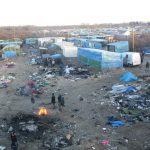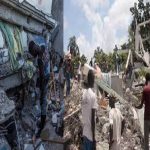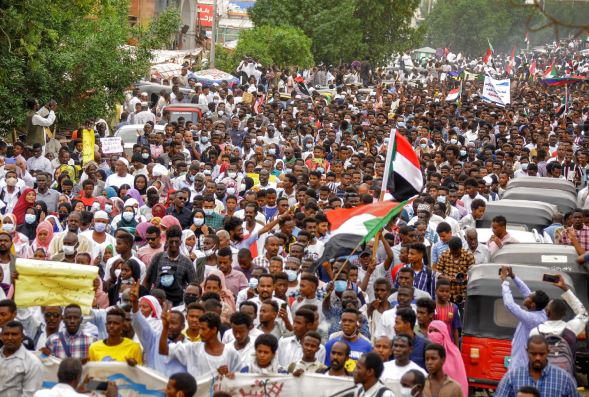Senior Taliban officials have appealed to the international community for assistance in combating the country’s increasing economic crisis, which has fueled worries of a new refugee exodus from Afghanistan.
The new Islamist Taliban government’s attempt to engage with the international community, four months after seizing power in Kabul, was highlighted at a special gathering to mark the UN’s annual migrants day.
Sher Mohammad Abbas Stanikzai, the movement’s deputy Foreign Minister, said it was the obligation of countries like the United States, which have blocked billions of dollars in central bank reserves, to assist Afghanistan in its recovery after decades of war.
Without immediate assistance, UN agencies estimate that millions of Afghans may go hungry this winter, but aid has been delayed by foreign reluctance to engage directly with the Taliban, in part due to concerns about women’s rights and political inclusion.
Following the Taliban takeover, the abrupt removal of international help has brought Afghanistan’s frail economy dangerously near to collapse. Millions of people are out of work, and the banking system is only partially operational.
The US has released instructions allowing personal cash transfers to Afghanistan, but it has not relented in its refusal to release the $9 billion in central bank reserves or relieve sanctions on a number of Taliban leaders.
Senior Taliban officials have appealed to the international community for assistance in combating the country’s increasing economic crisis, which has fueled worries of a new refugee exodus from Afghanistan.
The new Islamist Taliban government’s attempt to engage with the international community, four months after seizing power in Kabul, was highlighted at a special gathering to mark the UN’s annual migrants day.
Sher Mohammad Abbas Stanikzai, the movement’s deputy Foreign Minister, said it was the obligation of countries like the United States, which have blocked billions of dollars in central bank reserves, to assist Afghanistan in its recovery after decades of war.
Without immediate assistance, UN agencies estimate that millions of Afghans may go hungry this winter, but aid has been delayed by foreign reluctance to engage directly with the Taliban, in part due to concerns about women’s rights and political inclusion.
Following the Taliban takeover, the abrupt removal of international help has brought Afghanistan’s frail economy dangerously near to collapse. Millions of people are out of work, and the banking system is only partially operational.
The US has released instructions allowing personal cash transfers to Afghanistan, but it has not relented in its refusal to release the $9 billion in central bank reserves or relieve sanctions on a number of Taliban leaders.
Senior Taliban officials have appealed to the international community for assistance in combating the country’s increasing economic crisis, which has fueled worries of a new refugee exodus from Afghanistan.
The new Islamist Taliban government’s attempt to engage with the international community, four months after seizing power in Kabul, was highlighted at a special gathering to mark the UN’s annual migrants day.
Sher Mohammad Abbas Stanikzai, the movement’s deputy Foreign Minister, said it was the obligation of countries like the United States, which have blocked billions of dollars in central bank reserves, to assist Afghanistan in its recovery after decades of war.
Without immediate assistance, UN agencies estimate that millions of Afghans may go hungry this winter, but aid has been delayed by foreign reluctance to engage directly with the Taliban, in part due to concerns about women’s rights and political inclusion.
Following the Taliban takeover, the abrupt removal of international help has brought Afghanistan’s frail economy dangerously near to collapse. Millions of people are out of work, and the banking system is only partially operational.
The US has released instructions allowing personal cash transfers to Afghanistan, but it has not relented in its refusal to release the $9 billion in central bank reserves or relieve sanctions on a number of Taliban leaders.
Senior Taliban officials have appealed to the international community for assistance in combating the country’s increasing economic crisis, which has fueled worries of a new refugee exodus from Afghanistan.
The new Islamist Taliban government’s attempt to engage with the international community, four months after seizing power in Kabul, was highlighted at a special gathering to mark the UN’s annual migrants day.
Sher Mohammad Abbas Stanikzai, the movement’s deputy Foreign Minister, said it was the obligation of countries like the United States, which have blocked billions of dollars in central bank reserves, to assist Afghanistan in its recovery after decades of war.
Without immediate assistance, UN agencies estimate that millions of Afghans may go hungry this winter, but aid has been delayed by foreign reluctance to engage directly with the Taliban, in part due to concerns about women’s rights and political inclusion.
Following the Taliban takeover, the abrupt removal of international help has brought Afghanistan’s frail economy dangerously near to collapse. Millions of people are out of work, and the banking system is only partially operational.
The US has released instructions allowing personal cash transfers to Afghanistan, but it has not relented in its refusal to release the $9 billion in central bank reserves or relieve sanctions on a number of Taliban leaders.
Senior Taliban officials have appealed to the international community for assistance in combating the country’s increasing economic crisis, which has fueled worries of a new refugee exodus from Afghanistan.
The new Islamist Taliban government’s attempt to engage with the international community, four months after seizing power in Kabul, was highlighted at a special gathering to mark the UN’s annual migrants day.
Sher Mohammad Abbas Stanikzai, the movement’s deputy Foreign Minister, said it was the obligation of countries like the United States, which have blocked billions of dollars in central bank reserves, to assist Afghanistan in its recovery after decades of war.
Without immediate assistance, UN agencies estimate that millions of Afghans may go hungry this winter, but aid has been delayed by foreign reluctance to engage directly with the Taliban, in part due to concerns about women’s rights and political inclusion.
Following the Taliban takeover, the abrupt removal of international help has brought Afghanistan’s frail economy dangerously near to collapse. Millions of people are out of work, and the banking system is only partially operational.
The US has released instructions allowing personal cash transfers to Afghanistan, but it has not relented in its refusal to release the $9 billion in central bank reserves or relieve sanctions on a number of Taliban leaders.
Senior Taliban officials have appealed to the international community for assistance in combating the country’s increasing economic crisis, which has fueled worries of a new refugee exodus from Afghanistan.
The new Islamist Taliban government’s attempt to engage with the international community, four months after seizing power in Kabul, was highlighted at a special gathering to mark the UN’s annual migrants day.
Sher Mohammad Abbas Stanikzai, the movement’s deputy Foreign Minister, said it was the obligation of countries like the United States, which have blocked billions of dollars in central bank reserves, to assist Afghanistan in its recovery after decades of war.
Without immediate assistance, UN agencies estimate that millions of Afghans may go hungry this winter, but aid has been delayed by foreign reluctance to engage directly with the Taliban, in part due to concerns about women’s rights and political inclusion.
Following the Taliban takeover, the abrupt removal of international help has brought Afghanistan’s frail economy dangerously near to collapse. Millions of people are out of work, and the banking system is only partially operational.
The US has released instructions allowing personal cash transfers to Afghanistan, but it has not relented in its refusal to release the $9 billion in central bank reserves or relieve sanctions on a number of Taliban leaders.
Senior Taliban officials have appealed to the international community for assistance in combating the country’s increasing economic crisis, which has fueled worries of a new refugee exodus from Afghanistan.
The new Islamist Taliban government’s attempt to engage with the international community, four months after seizing power in Kabul, was highlighted at a special gathering to mark the UN’s annual migrants day.
Sher Mohammad Abbas Stanikzai, the movement’s deputy Foreign Minister, said it was the obligation of countries like the United States, which have blocked billions of dollars in central bank reserves, to assist Afghanistan in its recovery after decades of war.
Without immediate assistance, UN agencies estimate that millions of Afghans may go hungry this winter, but aid has been delayed by foreign reluctance to engage directly with the Taliban, in part due to concerns about women’s rights and political inclusion.
Following the Taliban takeover, the abrupt removal of international help has brought Afghanistan’s frail economy dangerously near to collapse. Millions of people are out of work, and the banking system is only partially operational.
The US has released instructions allowing personal cash transfers to Afghanistan, but it has not relented in its refusal to release the $9 billion in central bank reserves or relieve sanctions on a number of Taliban leaders.
Senior Taliban officials have appealed to the international community for assistance in combating the country’s increasing economic crisis, which has fueled worries of a new refugee exodus from Afghanistan.
The new Islamist Taliban government’s attempt to engage with the international community, four months after seizing power in Kabul, was highlighted at a special gathering to mark the UN’s annual migrants day.
Sher Mohammad Abbas Stanikzai, the movement’s deputy Foreign Minister, said it was the obligation of countries like the United States, which have blocked billions of dollars in central bank reserves, to assist Afghanistan in its recovery after decades of war.
Without immediate assistance, UN agencies estimate that millions of Afghans may go hungry this winter, but aid has been delayed by foreign reluctance to engage directly with the Taliban, in part due to concerns about women’s rights and political inclusion.
Following the Taliban takeover, the abrupt removal of international help has brought Afghanistan’s frail economy dangerously near to collapse. Millions of people are out of work, and the banking system is only partially operational.
The US has released instructions allowing personal cash transfers to Afghanistan, but it has not relented in its refusal to release the $9 billion in central bank reserves or relieve sanctions on a number of Taliban leaders.














